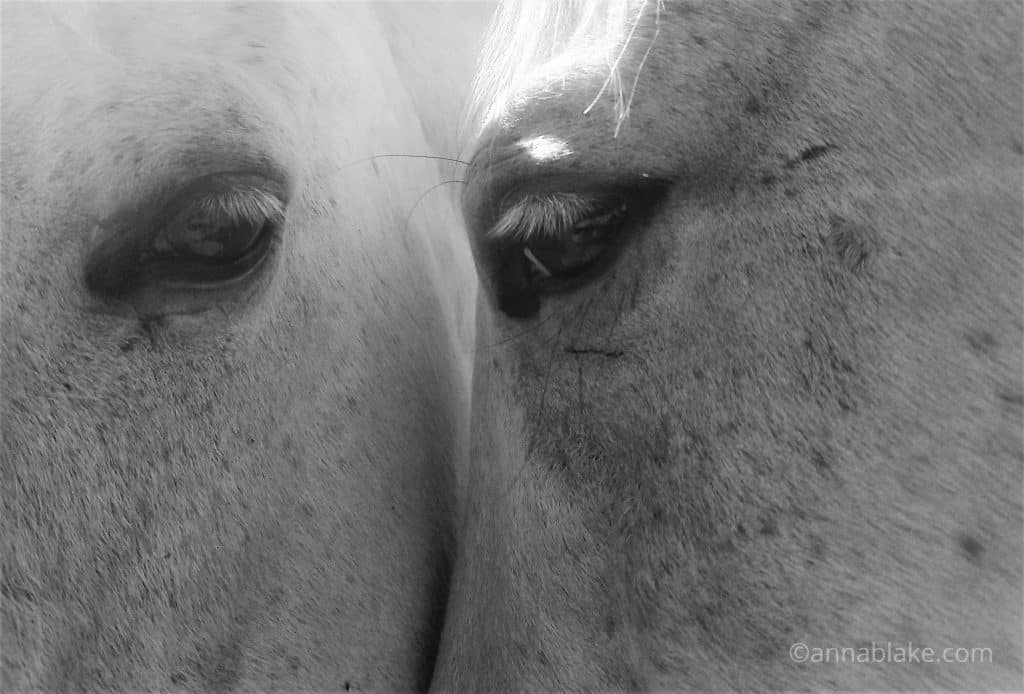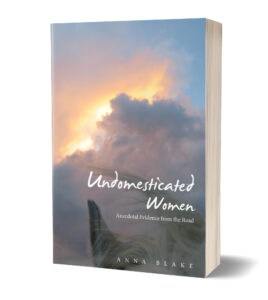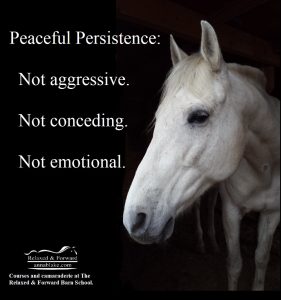
I’m talking to a new client who contacted me for help, asking them to tell me about their horse. They begin by explaining to me that they love their horse. I want to stop them already. I know it’s bad, but I am the very last person on the earth that anyone needs to explain that to. It’s my job to witness our love for horses in all of its glory and ugliness, all its colors and tones. I am like a hardware store paint chip display in the way I understand the depth and varieties of love we have for horses.
But they need me to know it’s more than that. It’s the really-can’t-live-without-them kind of love. The sobbing grief they feel every day for their “heart horse” who came to a tragic end, dying of old age years before. I want to say that old age is something to celebrate. I didn’t mention that I’ve held a newborn filly’s head up so the vet could euthanize her. Because it isn’t a competition. But if loving horses solved their problems, I would joyously be out of work and home with my horses. Who, you guessed it, I love very much.
They explain the horse’s problem. Maybe the horse is hard to halter or won’t load in the trailer. Often, they are behavioral issues that stem from fear-based training as youngsters. We’re left with an epidemic of damaged adult horses who can’t be stoic about trauma any longer. Second place goes to “bad” behavior by a horse who “knows better.” The horse is in pain, and we frequently mistake that for disobedience. Hooray for anyone who asks for professional help. Even if they have asked a few pros already and not liked their answers, it is still a wonderful thing when horse people ask for help. It doesn’t come easy for most of us.
Then they immediately jump back to affirm they love their horse as if contacting a trainer is a kind of betrayal. I ask them to tell me about their horse again. You know this part. We start with the horse’s birth, bloodlines, and breed. Or the sordid tale of their rescue. What we imagine their beginning in life was like. Then the story of how they got the horse, followed by a day-by-day account of their history. I want to hear this part, and I might not trust the owner’s conclusions, but that’s why they hired me. I cluck and shoosh them on, what is their horse like, I ask again. I’m hoping to get a sense of personality, for lack of a better word. Confidence is everything to a flight animal, and the lack shows in many seemingly unrelated ways.
The owner will tell me things like their horse is easy to halter, or reluctant to pick up his hooves. We set stock in the horse coming to be with us, feeling that it shows our horse loves us back. I’m not sure how a nicker at feeding time is a love commitment, but I bite my tongue. They tell me their horse loves grooming or jumping or trail riding. When I ask how their horse shows that love, they can’t name a calming signal. We just know the horse loves it.
I don’t want to be a party pooper, but the horse has been described by what they do for the owners. It’s as if someone describes their life partner as someone who cooks, cleans, and makes a home. As if someone describes their life partner as a good provider and someone who does lawn care. These are wonderful skills but they’re not who the person is. Horses are more than the tasks they do.
After my light admonishment, they usually tell me about the pecking order of the herd. They set stock in who the leader is and who gets along with everybody, what it means to be in the middle of the herd. Some see being at the bottom of the pecking order to be a good thing.
Eventually, I will tell my client that everything they taught us about dominance in the herd dynamic has been debunked. The thing that made sense to us simply isn’t how horses think. It was never true in the first place, which means a lifelong horse person is going to have to rethink everything. It’s a huge can of worms to open at the first meeting.
I know how that feels. I grew up knowing that I had to dominate horses. It made sense in my human brain. I could see dominant behaviors in my family, schoolmates, and even at church. Our culture is built around class, education, and income. Those societal labels do not describe who we are, either.
But horses are not predators. Herd animals are rarely aggressive. We know that, but we don’t hold it present in our love-addled brains. Oldtimers told us that if you want to know who the “alpha” horse is you throw an apple into the pen and the horse that gets it is the leader. We missed the point for generations of horses. Now we understand that food aggression is frequently tied to gastric issues. Horses tell us about their pain at every meal. We set stock in moving feet as a dominant trait, but how often do we mistake the horse with the most anxiety as being a leader? How many calming signals do we think are just cute faces our horse makes to entertain us?
Meanwhile, we’re busy putting our horses in boxes or arranging them on a list. While basking in what we are certain is their adoration of us, we are missing what they are asking us. Horses come to us for help, but we are blinded by our emotions, or misled by outdated beliefs. We give human solutions to horse problems. We listen to the horse as a lover would, rather than the neutrality of a health care worker or therapist. Horses need us to have a crucial and healthy detachment. That’s what a good trainer teaches their client to do.
Once again, I wonder why love is the thing we hold most high. As if the easiest part of horses is any kind of accomplishment on our part. As if pain, damage, and destruction don’t happen in the name of love. As if none of us have failed at love. As if love cured cancer. But if that’s our language, then loving horses means hearing their side louder than ours.
At some point, I will ask my new client if her horse is on any supplements. The list begins with several brand names. Then, she has a special trimmer, a vet that she trusts. There is a kind of bodywork that the horse gets, and maybe an equine chiropractor as well. Then a saddle fitter, or there should be. She wants me to know that she loves her horse and has a team that takes good care of him.
It’s taken me forever to learn to ask the most important and overlooked question. “Who’s in charge of caring for your horse’s mental health?”
…
 Available Now! Undomesticated Women, Anectdotal Evidence from the Road, is my new travel memoir. Ride along with us on a clinic tour through 30 states, 2 oceans, and 14k miles with me and my dog, Mister. It is an unapologetic celebration of sunsets, horses, RV parks, roadkill, diverse landscapes, and undomesticated women. Available now at Amazon, Barnes and Noble, and signed copies from me.
Available Now! Undomesticated Women, Anectdotal Evidence from the Road, is my new travel memoir. Ride along with us on a clinic tour through 30 states, 2 oceans, and 14k miles with me and my dog, Mister. It is an unapologetic celebration of sunsets, horses, RV parks, roadkill, diverse landscapes, and undomesticated women. Available now at Amazon, Barnes and Noble, and signed copies from me.
…
If you or your horse appreciate what I write, please Subscribe to this blog or join us at The Barn School. To follow Bhim’s Training Diary, click here.

Want more? Become a “Barnie.” Subscribe to our online training group with affirmative demonstration videos, audio blogs, daily quotes, free participation in “group lessons”, and live chats with Anna. Become part of the most supportive group of like-minded horsepeople anywhere.
Anna teaches ongoing courses like Calming Signals and Affirmative Training at The Barn School, along with virtual clinics and our infamous Happy Hour. Everyone’s welcome.
Visit annablake.com to find archived blogs, purchase signed books, schedule a live consultation, subscribe for email delivery of this blog, or ask a question about the art and science of working with horses.
It is sad that it takes us so long to realize that for better or worse we are in charge of watching out for their mental health.
To be fair, so much of what we deal with is baggage horses came with, and we have labored under false assumptions for a long time. Until it dawns on us that more of the thing that broke a horse won’t be what heals them. We are trying to do better, even when love gets in the way. Thanks, Peggy
Anna,
That is the most important question of all. Thank you.
Plenty of time with the herd is critical.
Does a horse want to be with us? He’ll always choose the herd over us and that’s perfectly natural.
Love always means letting go.
As predators, we want control of everything but we will never have their spirits.
Happy Holidays, Anna, and we wish you a wonderful New Year.
Nuala and David.
Isn’t that the painful truth, letting go. Thanks Nuala, and best wishes.
Wow, Anna, so well said. I am, in my old age, learning to think “What can I do for my horse when I go out there today?” instead of “What thing should we work on in the arena today? Leg yield? Better canter depart? Should I use the ‘snowman’ pattern?” – which is all about what can I get the horse to do, what can he do for me today. Of course it would be cool if we get to the snowman pattern, but really, what can I do for my horse when I go out there today? Or, how I can BE with my horse when I go out there today? Or, I wonder what my horse will tell me or ask me when I go out there today, and can I be a good listener?
Exactly. Have a plan in mind, but then listen. Thanks, Amber.
It has taken a lifetime to unlearn how I was taught in the beginning. My oldest horse nearly 25 let me me know his teeth hurt (dont get me started on Russian bred Arabians and teeth issues as they age) and we are scheduled to get the bad teeth removed. So we are using a bitless bridle for his comfort. I caught some flack on a trail ride because heaven forfend he didn’t have a bit in his mouth. How was I in control? Answer to that is I’m not. The strongest bit won’t stop him but our partnership will. I hope we were an example that day.
And just like that, the world changes. Thanks, Mary.
Remarkable, Mary, and commendable. I used a bitless bridle on my Off-Track Thoroughbred since the time he was four,
until last year (he’s now 17-1/2). I have ridden him all those year with not one instance of a problem. I stopped riding
last year (I am now 70), and now we play games, do fitness exercises and go for walks all in-hand. I totally agree with you
that it’s an ethical, and respectful partnership with this fine species that is of the greatest importance.
Thank you so much for setting such a fine example.
Nuala
I’m so glad that people are finally looking to pain as a reason for “bad” behavior!
Also, I’d like permission to post your messages on my Chesapeake Dressage Institute Facebook page. Can you make them Sharable, please?
Me, too! Please share as you like. They are sharable from my FB page: https://www.facebook.com/relaxedforward
This blog and others can be found at: https://annablake.com/relaxed-forward-blog/
Thank you, Janet!
Wow. This sounds like every dog behavior consult I’ve ever done.
Yup. Horses aren’t predators, so it’s a bit different. But not so much in the big picture. Thanks Kelley
“If Only Love Was Enough” was the title of a pamphlet that my favorite rescue facility distributed to would-be adopters of horses in their care. They went on to explain in the pamphlet what people needed to know before they took on the responsibility of ownership. I don’t remember that it covered a horse’s mental health, but the basic needs were important to know.
Thanks, Anna, for this important piece.
Sounds like a good title. It’s easy for rescues to pull at our heartstrings… Thanks Lynell
Makes me think back to the first barn I boarded at & the one where I bought my horse. They had a hackline and bought many horses from the local auction – which was another story. The owner would lease horses out for the winter – in too many cases , no background on where they were going, if the person understood how to care for them etc etc. Too many came back in the spring looking like camp horses – underfed, uncared for – all that. Same deal when she sold horses to people who had NO experience with them – some of them boarded at the barn & learned by osmosis, more or less. It was disturbing in many ways. A pamphlet would have been really helpful! And somehow, we stayed there for four years! I did learn a lot but not all good.
Thank you for your post, Maggie. The rescue to which I refer which is still in operation today, was founded by a caring couple whose first horse was rescued by them because it had been abandoned by the owner at a boarding facility where they had their own horse at the time.
Their mission is – and always has been – to ensure quality care of horses through intervention, education and outreach to the community. I came to them (in ignorance) in 1995 to get a horse and, as many adopters, became a volunteer and supporter of their mission. In short, they don’t just adopt out horses, they strive to educate the community at large: “DEFHR welcomes horse lovers of all ages and experiences to be part of the solution and become an equine advocate. We believe prevention begins with education and offer a wide array of educational opportunities and programs…” I can vouch for this from being an active volunteer for them for over 15 years.
https://defhr.org/about/
Also self-serving, but in a different way, I love my horse for all the things he has taught me. I adopted him from BLM as a three-year old. He is confident in nature, grew up with only horses and knew all the rules, and was pretty sure he didn’t need me for anything. It took me two weeks to earn the right to touch him. But, oh, the learning that happened after that! Once we established that I was nothing more or less than an old mare, he was willing for anything, as long as I made it make sense to him. After a lifetime of horses that I could afford, meaning always holes in their training, I only regret that I didn’t have this horse much earlier on. I could have recognized the true horse, under and behind all the things people had instilled in them. This true horse is a miracle of honesty, willingness, and cooperation. He doesn’t run to me when I approach. He yawns. And I accept it as a compliment.
It’s a crime the way we start horses… Glad for your true horse. Thanks Melinda.
Hi Anna,
I love your very last thought since our horses are all involved in helping kids work through some horrible trauma, I wonder sometimes what toll they pay for us to cry on their lovely broad shoulders. During the off season when we don’t have kids coming out I like to just take them out and spend time just “being with them and making no demands at all.
Is your workshop schedule posted somewhere? I really enjoyed the clinic you did here in Hillsborough NC and can’t wait to attend another!
Ron
Hi Ron. I agree, those horses are saints,carrying layers of our emotions on top of their own. I’m glad they get time off with peaceful company. Thanks for what you do there.
I haven’t scheduled clinics next year. New courses will be posted sooner at the Barn School here: https://relaxedandforward.com/feed
Wishing you a good holiday season.
Anna, As always you hit the nail on the head. Please don’t stop being a party pooper! it’s how you wake us love-sick horse people up! I just need a cold splash of water every now and then!